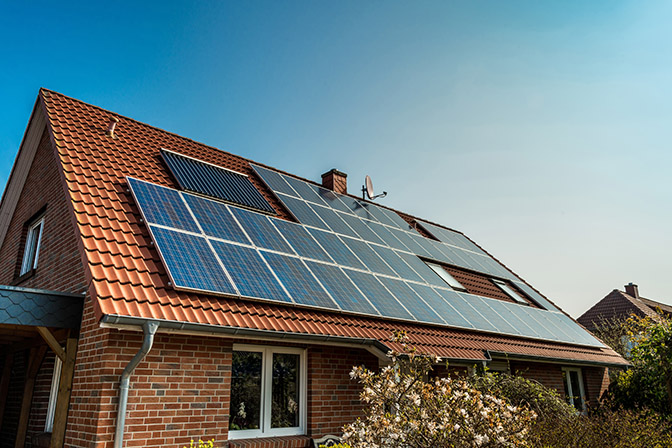
As the demand for sustainable living continues to rise, eco-friendly home upgrades are becoming increasingly popular among homeowners and prospective buyers. Investing in green improvements not only helps protect the environment but also enhances the comfort and efficiency of your home. Additionally, these upgrades can significantly increase the value of your property. If you’re looking to sell your Connecticut home and boost its market appeal while contributing to a greener future, consider these eco-friendly upgrades.
Energy Savings: Solar panels can drastically reduce your electricity bills by harnessing the power of the sun to generate energy.
Increased Home Value: Homes with solar panels often sell at a premium, as buyers are attracted to the prospect of lower utility costs.
Tax Incentives: Federal and state tax incentives can offset the initial investment cost of solar panel installation.
Assess Your Roof: Ensure your roof is in good condition and receives ample sunlight throughout the day.
Choose the Right System: Consult with a professional to determine the best solar panel system for your home’s energy needs and layout.
Reduced Energy Costs: Energy-efficient windows minimize heat loss in the winter and keep your home cooler in the summer, leading to lower heating and cooling bills.
Enhanced Comfort: These windows reduce drafts and improve indoor temperature stability.
Noise Reduction: Energy-efficient windows often provide better insulation against outside noise.
Select the Right Windows: Look for windows with low-E (low-emissivity) coatings, double or triple glazing, and insulating gas fills.
Professional Installation: Ensure windows are installed properly to maximize their energy-saving benefits.
Energy Efficiency: Proper insulation reduces the need for heating and cooling, leading to significant energy savings.
Improved Comfort: Insulation maintains a consistent indoor temperature, enhancing overall comfort.
Environmental Impact: Reduced energy consumption means a lower carbon footprint.
Identify Key Areas: Focus on insulating the attic, walls, and floors, as these areas typically have the most significant impact on energy efficiency.
Choose Eco-Friendly Materials: Consider using sustainable insulation materials such as cellulose, recycled denim, or sheep’s wool.
Energy Savings: Smart thermostats optimize heating and cooling schedules based on your lifestyle, reducing unnecessary energy usage.
Convenience: These devices can be controlled remotely via smartphone apps, allowing you to adjust settings even when you’re not home.
Data Insights: Smart thermostats provide energy usage reports, helping you identify opportunities for further savings.
Compatibility Check: Ensure your HVAC system is compatible with the smart thermostat you choose.
Professional Installation: While many smart thermostats are DIY-friendly, professional installation can ensure optimal performance.
Lower Water Bills: Water-efficient fixtures reduce water consumption, leading to lower utility bills.
Conservation: Using less water helps preserve this valuable resource and reduce the strain on local water supplies.
Enhanced Home Value: Eco-conscious buyers are increasingly looking for homes with water-saving features.
Upgrade Faucets and Showerheads: Install low-flow faucets and showerheads to reduce water usage without sacrificing performance.
Replace Toilets: Consider replacing old toilets with dual-flush or low-flow models to significantly cut down on water use.
Curb Appeal: Sustainable landscaping enhances the beauty of your home’s exterior, making it more attractive to potential buyers.
Water Conservation: Native plants and drought-resistant landscaping reduce the need for frequent watering.
Biodiversity: Planting native species supports local wildlife and promotes biodiversity.
Choose Native Plants: Select plants that are native to Connecticut’s climate, as they require less water and maintenance.
Install Rain Barrels: Collect rainwater to use for irrigation, reducing your reliance on municipal water supplies.
Mulch and Compost: Use organic mulch and compost to enrich soil, retain moisture, and reduce the need for chemical fertilizers.
Reduced Energy Consumption: Energy-efficient appliances use less electricity, lowering your energy bills.
Environmental Impact: Lower energy usage translates to a reduced carbon footprint.
Modern Amenities: New appliances often come with advanced features that enhance convenience and functionality.
Look for Energy Star Ratings: Choose appliances with the Energy Star label, indicating they meet energy efficiency guidelines set by the EPA.
Proper Disposal: Ensure old appliances are recycled properly to minimize environmental impact.
Eco-friendly upgrades are a smart investment for Connecticut homeowners looking to increase their property value while promoting sustainable living. By incorporating energy-efficient technologies, water-saving fixtures, and sustainable landscaping practices, you can create a more comfortable and environmentally conscious home. Not only do these upgrades provide financial benefits through reduced utility bills and potential tax incentives, but they also make your home more attractive to eco-conscious buyers. If you’re ready to enhance your home’s value and contribute to a greener future, consider implementing these eco-friendly upgrades.